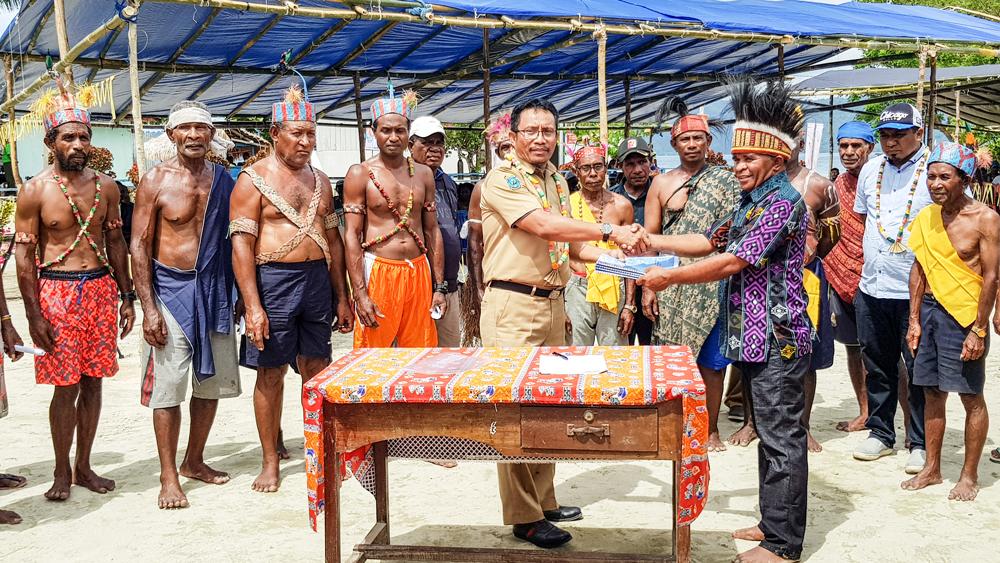On Tuesday, Indonesia officially designated the Dampier Strait as a protected TURF (Territorial Use Rights in Fisheries) network. At 211,000 hectares and encompassing 19 villages, the Dampier Strait network is the largest comprehensive TURF-Reserve network in the world. This year-long effort is supported by the United States Government through the United States Agency for International Development Sustainable Ecosystems Advanced (USAID SEA) project and Rare within Indonesia. The Dampier Strait TURF Network lies within the larger Dampier Marine Conservation Area, a marine area protected by the Indonesian government in 2014.
The formal agreement, led by the Maya Tribe Adat Council in Raja Ampat, West Papua, and signed by 58 local leaders in the Dampier Strait, has established 21 areas of protected inshore marine waters where user rights to local have been designated. The agreement includes a range of new fisheries regulations (minimum size limits on fish, prohibiting destructive fishing, as well as area and seasonal restrictions) to secure a sustainable food supply for local indigenous groups.

“Adat for the people of Papua is a belief system that supports and ensures that we, the people of Papua, can better manage natural resources for our survival,” said Kris Thebu, Chair, Maya Tribe Adat Council. “Indigenous Fisheries in Raja Ampat is a customary system that ensures that indigenous peoples Maya tribe keep and utilize the sea and fish resources wisely.”
Today’s announcement is the result of an investment made by Feed the Future, the U.S. Government’s global hunger and food security initiative, into the USAID SEA project to ensure that improvements in coastal fisheries management also contribute to strengthened food and livelihood security for local communities. The USAID SEA project is a five-year initiative to support marine conservation and improved fisheries management in Indonesia. Over the past year, USAID SEA partnered with Rare to work with the Maya Tribe Adat Council and other government and community leaders to develop policy and regulatory pathways, engage communities to identify key fisheries and develop site selection, and work on economic development and financial inclusion opportunities.
A central tenet of Rare’s fisheries program Fish Forever is improving food security by securing sustainable fisheries for coastal communities. In Dampier Strait, Rare’s village surveys found that households within the Marine Protected Area were “food insecure.” The designation of Dampier Strait as a TURF Reserve network will improve local food security by providing a sustainable source of protein (fish) for Indigenous communities heavily reliant on small scale fisheries as well as protect important marine habitats such as coral reefs and seagrass beds. Additionally, Fish Forever and USAID SEA aim to empower women in local fishery enterprises, to build food security for their villages.
“Coastal communities rely heavily on the integrity of their marine resources,” said Marthen Luther Bartolemeus Imbir, Head of Fisheries Office of Raja Ampat District. “Today’s announcement will help maintain the fish resources in the waters of Raja Ampat and improve the life of coastal communities in 19 villages in Bantanta Island and Salawati Island.”
“One key to good management of marine conservation areas in Raja Ampat is community involvement in the planning and implementation of management efforts,” said Sjafrie Tuharea, Head of Technical Operating Unite/Marine Conservation Area Raja Ampat. “What the Maya Tribal Peoples do with the establishment of this protected reserve is a testament to their commitment to maintain this important area economically, culturally and socially.”
Today’s announcement builds on a strong history of work in the region with other partners including the World Wildlife Fund, Conservation International, and The Nature Conservancy. Rare has partnered with these organizations to combat coastal overfishing, the most immediate threat to our oceans and the communities that depend on them. Indonesia’s coastal fisheries are an essential source of food, income and cultural heritage to its people. Sixty percent of Indonesian fishers, or 1.6 million people, are small-scale fishers, and 85% of their catch is used for human consumption. Indonesia has the second longest coastline in the world, and 40% of the population (roughly 100 million people) lives near the coast. Coastal fisheries therefore play an essential role in national food security and nutritional health in this archipelagic nation.
Unfortunately, these immense coastal resources are severely threatened by unsustainable fishing practices, degradation of critical marine habitats and non-fishing stressors such as climate change. As a result, more than 20% of Indonesia’s fish stocks are assessed to be overexploited or overly depleted. Threatened marine species include snapper, grouper, rabbit fish, sea cucumber, and lobster.
“With this landmark declaration, Indonesia has emerged as a leader in applying effective solutions that provide benefits to people as well as nature,” said Dr. Steve Box, Senior Vice President of Fish Forever at Rare. “What we are seeing here in the Dampier Strait – effective local protection built on community empowerment and improved food and economic security – is a great model for the international community in how to solve coastal overfishing.”
“The problem of small scale fisheries that occur in almost all coastal communities is open access,” said Taufiq Alimi, Vice President of Rare Indonesia. “Anybody can come and take fish without any limits and not infrequently, some fishermen use destructive fishing gear. If this continues the result are damaged and depleted marine and fishery resources. Rare with support from the USAID SEA Project encourages better fisheries management especially in coastal waters. Today’s designation gives fishermen the certainty of their livelihoods as they become the first beneficiaries of the marine areas they are guarding.”